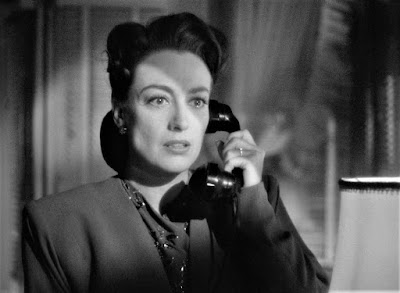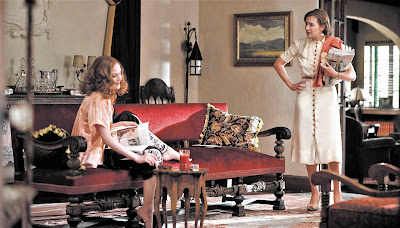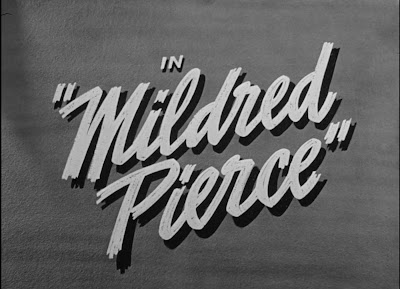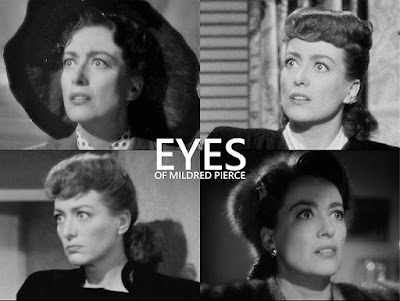Spoiler Alert: Crucial plot points are revealed in the interest of critical analysis and discussion
For me, Mildred Pierce has always been the most watchable and quotable of Joan Crawford’s movies. Which is really saying something with gold-plated doozies like Strait-Jacket, Torch Song, Berserk!, Queen Bee, and Flamingo Road staring me in the face.
This film that won Crawford her first Oscar nomination and only win (she would be nominated two more times) ranks so high on my list of favorite movies that, by rights, I should have written about it long before now. But like many classic-era films that also enjoy broad popularity, Mildred Pierce is a movie that's been talked about, written about, analyzed, remade, lampooned, and borrowed from for so long, it simply felt as though I had nothing new to add to the conversation.
That's probably still the case. But the occasion of having recently read, back-to-back, the 1941 James M. Cain novel (upon which the film is based) and a terrific 1980 scholarly volume by film historian Albert J. LaValley devoted to the academic discussion of Mildred Pierce (!) complete with the published screenplay – left me with so much Mildred on my mind, the time felt right to commit my personal thoughts on this long-beloved film, to this, my internet film diary.
.jpg) |
| Joan Crawford as Mildred Pierce |
.jpg) |
| Jack Carson as Wally Fay |
 |
| Ann Blyth as Veda Pierce |
 |
| Zachary Scott as Monte Beragon |
 |
| Eve Arden as Ida Corwin |
The romanticized Stella Dallas myth—embracing the nobility of maternal love that sacrifices everything to secure the financial and social success of one’s child—gets a severe upending in Mildred Pierce. This surprisingly still-potent melodrama casts Crawford as a working-class divorcee and mother of two (the titular Mildred) whose obsessive/neurotic love for her serpent-toothed eldest, Veda (Blyth), provides the grist that fuels a determined ambition to build a sweeping financial empire on fluffy pie crusts. The drama of this tale is that the same mother-daughter bond…whose dynamics are entrenched in emotional and psychological dysfunction (with a scoop of the Electra complex on top)… figures just as significantly in bringing about Mildred’s personal and professional ruin.
 |
| Butterfly McQueen as Lottie |
Ms. McQueen made her uncredited film debut in 1939 appearing alongside Joan Crawford in George Cukor's The Women. By 1945 she'd appeared in such high-profile films as Gone with the Wind, Cabin in the Sky, and Since You Went Away. Yet despite the size and memorability of her role in Mildred Pierce, her name doesn't appear in the credits.
For all the talk of this being the film to reverse Crawford’s fortunes, helping to erase the stigma of boxoffice poison that dogged her following her so-called amicable ouster from MGM; Mildred Pierce, oddly, represents less a departure from type than some of her other roles. Indeed, in many ways, Mildred Pierce serves up an à la carte menu of everything that first comes to mind when I think about Joan Crawford’s screen persona.
If I’m guilty of harboring a mental image of The Crawford Mystique as: the inevitable ankle strap shoes, always brandishing a gun, invariably slapping somebody, suffering nobly in shoulder-padded mink, photographed through impossible shadow formations highlighting her eyes, and playing characters disposed of a steely self-determinism…then, Mildred Pierce does not disappoint. It's all here.
 |
| Me and My Shadows Few stars got as much use out of the "floating shadow" as Joan Crawford |
As movie characters go, the been-around-the-block maturity of “common frump” Mildred Pierce-Beragon is ideally-suited to both the gifts and limitations of then-38-year-old Crawford. Playing what is essentially just a more lived-in variation of her usual stock-in-trade: “…the shop girl who fought her way to the top, made a great success” (God help me, I’m quoting Mommie Dearest). An image established as early as 1930's Our Blushing Brides--one of Crawford's earliest post-silent era features--Mildred Pierce is a challenging role that nevertheless remains comfortably within Crawford’s tried-and-true wheelhouse. And to give credit where credit is due, Crawford, clearly recognizing the sharp script, showcase role, and atypically noirish milieu of Mildred Pierce for the rare opportunity it is, gives her performance everything she’s got.
Mildred Pierce didn't introduce the classic Joan Crawford persona, but it certainly solidified it. When Crawford good-naturedly spoofs her image and herself in the Warner Bros musical comedy It's a Great Feeling (1949), the dialogue and gestures she uses (capped with "I do that in all my pictures!") are from Mildred Pierce. It’s safe to say that virtually the entire Joan Crawford arsenal is trotted out in Mildred Pierce. But somehow, in this instance, thanks to the overall classy production values, tight script, and unusually strong supporting cast (and maybe because Crawford worked extra hard to impress a director who made no secret of Barbara Stanwyck being his first choice), many of those familiar Crawford-ism notes are struck with a considerably lighter touch.
WHAT I LOVE ABOUT THIS MOVIE
The end-product of at least 8 screenplay drafts by nearly as many writers, Mildred Pierce is a film-noir - crossed with a domestic drama - crossed with a postwar woman’s film. The postwar designation denoting the newly-determined genre trend in having the female-driven narratives end on a note of “normalcy” restored…i.e., a return to traditional gender roles. Thus, in the screen ending that’s a tad kinder to Mildred than Cain’s novel (which ends flatly with Mildred standing by helplessly as she’s made a fool of, two times over), Mildred is financially ruined and loses her business empire, but walks off into the L.A. sunrise, arms linked with her recently redeemed, now-steadily employed, likely ex-ex-husband.
.jpg) |
| Bruce Bennett as Albert "Bert" Pierce |
The seamless manner in which Mildred Pierce blends these different genres (doing credit to each and with a considerable amount of humor nowhere to be found in Cain’s novel) is precisely why it endures as one of those movies that, despite owning the DVD, I can’t help watching…no matter how far along into the story…whenever it pops up on TV. It’s old-fashioned Hollywood filmmaking at its captivating best.
It's said that Paramount's success with Cain's Double Indemnity (1944) is what inspired Warners to update (from the '30s to 'mid-'40s) and insert a murder into Cain's Mildred Pierce, which is essentially a character study and Depression-era commentary on class struggle. Cain was less than happy about his book being turned into a film noir, but I think the changes give Mildred Pierce a focus and economy lacking in the book. I thoroughly enjoyed and was very impressed by the faithful-to-the-letter 2011 Kate Winslet Mildred Pierce miniseries. But the narrative fidelity and Winslet's more human-scaled performance amplified what the Crawford film moves too quickly for me to have noticed: Mildred's blind-spot where the unremittingly awful Veda is concerned paints her more of a dope than devoted.
 |
| "That would have been dreadfully recherché, n’est-ce pas?" Mildred and Monte share a look in response to Veda being Veda |
The character of Mildred Pierce isn’t granted much in the way of self-awareness, but it's a nice touch (one preventing her from appearing to be stupid) for the script to allow for a couple of scenes that show Mildred to both aware and condescendingly tolerant of Veda's airs and pretensions.
The idea of Mildred as a resourceful but not very insightful woman (the novel cites her flaw as a tendency towards literal-mindedness) might have occurred to me before had 1945's Mildred Pierce been cast with any other actress. In anyone else's hands, the scene where Mildred sells Monte a third of her hard-earned business to get him to marry her just so she can re-welcome Veda-the-Viper back into the fold, would have audiences wanting to haul off and slap Mildred themselves.
But in the hands of Joan Crawford—self-mastery personified—those actions seem more determinedly willful than pathetic. An act of noble self-sacrifice of the sort that has been Crawford’s stock-in-trade for years.
And therein lies the key to one of the major reasons why Mildred Pierce is such an enjoyable film for me: It’s a movie that “gets” that the only way to soften Crawford’s image, making her brittle countenance even remotely sympathetic, is to have nearly every character in the film heap abuse on her head. From the first frames of the film to the last, Mildred places the needs of others above her own (and the one time she goes off to have some fun for herself, fate rewards her with the almost Biblically retributional sacrifice of a child) and is rarely thanked or praised for it. Even after defying the odds and achieving the near-impossible feat of becoming a wealthy businesswoman, building a mini-empire from the ground up (and developing a drinking problem for her trouble), any faint praise offered by others is usually followed by a crack about her smelling of chicken grease.
 |
| Joan Crawford at her happiest. Cleaning something. |
THE STUFF OF DREAMS
I think I devote so much space here reiterating how much I’m entertained by Mildred Pierce because, for all its glossy appeal and the perversity of its plot (Veda is a pretty active girl considering she only celebrates her 18th birthday at the END of the movie), it's a movie that's never really engaged me on any kind of emotional level. Which is perhaps not anything I’d otherwise be looking for in a genre film (film noir in particular tends to traffic in the cynical and jaded) except that when I read the novel I was surprised by how moving and sad I found Mildred Pierce to be. Two things I've never felt in all the times I've watched the movie.
 |
| Jo Ann Marlowe as Kay Pierce One of the more eye-opening disclosures in the novel is Mildred's guilty self-admission that if one of her children had to die, she's grateful it wasn't Veda. |
As an example of Hollywood studio system “product” from the days when the main objective of movies was to provide escapism and sell popcorn, Mildred Pierce is every bit as efficient as its titular character. It’s classically structured: character/goals/conflict/ resolution; market-friendly: it’s got drama, romance, glamour, & comedy; and streamlined to a noirish-T: gunplay, double-dealing, and the question of “Who shot Monte?” keep audiences in their seats. If the slick restructuring of Cain's character-study novel into a crime film perhaps excised some of its relatable humanity, at least the Oscar-nominated screenplay by Ranald MacDougall retains enough of the book's subtextual themes (gender disparity, class struggle, sexual competition, single motherhood, etc.) to make repeat visits to Mildred Pierce worthwhile.
 |
| Emancipated Woman |
 |
| Eve Arden and Jack Carson lighten and enliven Mildred Pierce |
PERFORMANCES
The talent and chemistry of the cast of Mildred Pierce is yet another factor contributing to its irresistible watchability. Everyone but 16-year-old Ann Blyth is cast to type (she, heretofore only appearing in light comedies) and each is at the top of their game. Crawford is held in restraint (for Crawford), Eve Arden is on-the-money with her trademark mordant wisecracks, and Blyth’s strong performance (better every time I see it) is deserving of the Best Supporting Actress Oscar nomination it garnered.
But for me, Mildred Pierce's Most Valuable Player--after Joan--is Jack Carson. Has there ever been a movie that isn’t made better by his casting? The earthy naturalness of his fast-talking Wally Fay not only takes the starch out of the humorless Mildred, but lends each of his scenes a bull-in-a-china-shop air of unpredictability. He shifts effortlessly from comic figure to force-to-be-reckoned-with, and I don’t think the film would be nearly as lively without him.
Veda's brief and ignominious stint as an entertainer is a personal high point of Mildred Pierce. Especially for my partner, who unfailingly breaks into peals of laughter at Veda's a-moving-target's-hard-to-hit choreography and scarf-flailing, bow-out exit.
THE STUFF OF FANTASY
From writing this blog I've learned that many families and couples have favorite movies that become in-house quotable staples over time. A phenomenon wherein repeated lines of dialogue or references to certain scenes have morphed into shared running gags.
In the 27 years my partner and I have been together, there are still only a handful of movies that have risen to those hallowed ranks. Andy Warhol's BAD is one of them ("O'Reilly O'Crapface."), All About Eve is another (Birdie - describing the wardrobe mistress: "She's got two things to do: carry clothes and press 'em wrong. And don't let anybody try to muscle in."). But Mildred Pierce is one of our most frequent go-to's for quotes and phrases repeated out of context that have become inside jokes. Quotes attributed to Veda proving to be a tad overrepresented.
Bert Pierce: "She plays piano like I shoot pool."
Mildred Pierce: "I took tips and was glad to get them."
Ida Corwin: "Personally, Veda's convinced me that alligators have the right idea. They eat their young."
Mildred Pierce: "I know you romantic guys. One crack about the beautiful moon and you're off to the races."
Mildred Pierce may not be as dark or thought-provoking as many of the films that captured my adolescent imagination in the late-'60s, and '70s.
But when I'm in the mood for a good "comfort food movie," Mildred Piece delivers.
BONUS MATERIAL
 |
| Evan Rachel Wood as Veda and Kate Winslet as Mildred |
In 2011, HBO premiered a five-part, five Emmy Award-winning miniseries
adaptation of Mildred Pierce that's so faithful to James M. Cain's novel
and so different from the 1945 film, there's no need to draw comparisons.
Bette Davis and Joan Crawford are forever linked in the pop-cultural consciousness, and moments like this don't help. A movie theater across the street from Mildred's Glendale eatery is showing the Bette Davis film Mrs. Skeffington (1944). Prior to this scene, when Mildred is seduced by Monte at his beach house, the music theme playing in the background is "It Can't Be Wrong" the Max Steiner/Kim Gannon melody composed for Bette Davis' Now Voyager (1942)
The Davis/Crawford connection continues with that slinky striped number Eve Arden's Ida wears to Veda's 18th birthday party, showing up 19 years later in the Bette-Davis-as-twins-again (A Stolen Life -1946) melodrama Dead Ringer (1964)...that's Bette in the phone booth. It's worn...sans shoulder pads...by jazz legend, pianist-vocalist, Perry Blackwell, who, as of this writing, recently celebrated her 97th birthday. Her granddaughter informed me that Ms. Blackwell was gifted the top by Eve Arden herself and that she recalls seeing it among her grandmother's performance costumes until she was about ten years old. Thanks to reader Richard Lloreda for bringing this costume rerun to my attention.
 |
| Mildred Pierce - Mildred Fierce |






.JPG)
.png)




